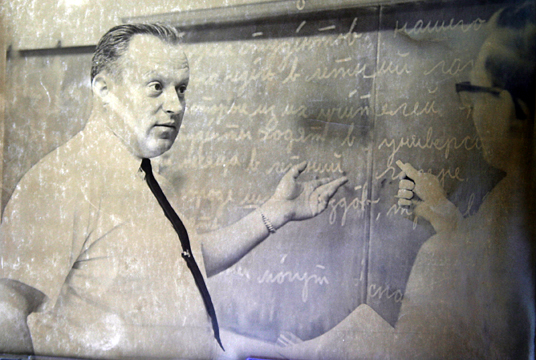 I was shocked and saddened to learn that Professor Silins, my Russian teacher and undergraduate advisor had passed away in early November. I studied Russian with Professor Silins all four years at Wabash and, thanks to him, in Krasnodar (Yekaterinodar), Russia through the ACM/GLCA program during my junior year abroad in 1989.
I was shocked and saddened to learn that Professor Silins, my Russian teacher and undergraduate advisor had passed away in early November. I studied Russian with Professor Silins all four years at Wabash and, thanks to him, in Krasnodar (Yekaterinodar), Russia through the ACM/GLCA program during my junior year abroad in 1989.
I am sorry that I cannot be at the memorial in person, but I want to join in celebrating the life of Professor Silins by offering you a few of my memories.
I studied Russian with Professor Silins in the late 1980s. Back then, St. Petersburg was called Leningrad and Russia was the "Evil Empire." I was intrigued by the appearance of words like "Perestroika" and "Glasnost" in the daily news so I signed up for introductory Russian during freshman orientation. Little did I know that I signed up for the toughest course on campus—a course that made Chem 3 homework assignments seem reasonable. I have a PhD in Chemistry and an MBA-- both from top schools—I can assure you that introductory Russian was one of the most difficult classes I have taken.
Sometimes we felt that Professor Silins brought to bear his experiences in the Army as an interrogator during the Nuremburg trials to separate the wheat from the chaff in the first semester. "Dammit man. You slay me!" he would say when he heard a Hoosier accent creep into Russian speech during oral recitations. "Pee-SATCH, not PEE-satch. Pee-SATCH means ‘to write.’ PEE-satch means ‘to piss.’ If you make that mistake in the wrong place they’ll cut off your ‘member’ with a rusty tin can! Remember! Practice with each other!"
The workload was immense, and after the first few weeks, he had whittled down the class from 15 to 7 dedicated students. He awarded no A’s the first semester—the top grade was an A-. "This generation of students doesn’t want to work," he would remark when people complained about test questions or grades.
Professor Silins made the course tough because he wanted students who where as committed to learning as he was to teaching. He invested in his students in a manner that stood out even at Wabash. I knew his wife and kids. He shared his life stories with me. He opened new worlds for me by preparing me and my classmate Tim Lyons ’91 for the practicalities of life in the Soviet Union during my junior year abroad. Then he helped Tim Lyons bring a Russian student, Yuri Fraken, to campus in 1990.
One of my most poignant memories is the story of Professor Silins told us about his experience of the Easter Sunday bombing of the Zeiss Optical Works in Leipzig Germany. At age fourteen, he was working there as a forced laborer under the Nazi regime. He described the factory emergency response systems in great detail. His role was that of a runner who would communicate messages between command posts. He described the terror the workers experienced during the bombing in great detail and how the calm attitude of his incident commander saved his life. During the bombing the light bulb in the fire station in his sector of the factory blew out and the emergency responders pressed him to run to the next station for a spare. The bombs were landing frequently, so his incident commander told him to ignore the pleas and wait. Moments later the gas lines were breeched and the tunnel leading to the neighboring command post was engulfed in an explosion. This was one of several times that he was spared death by a few seconds. I still remember this story more than 15 years after it was told to me.
Professor Silins told us stories about World War II and his life as a refugee because he wanted us to have the ability to look at our problems and lives in context. He wanted to help us learn to think critically. He wanted to help us look for nuances. He wanted us to appreciate what we have. I will never forget these stories and will tell them to my children. I have already told them to dozens of people.
Professor Silins loved Wabash. I will never forget the smile that broke out on his face one morning in November 1990 when a vaguely familiar ringing sound interrupted our discussion of a Chekhov short story. Tim and I rushed to the window to see "liberated" Monon Bell ringing, freshly arrived from Greencastle, as it was transported on the back of a salvaged Cadillac convertible. He relished the traditions, character, and values of the school. Professor Silins then cancelled class and went outside with us to celebrate.
I have many other memories of Professor Silins, as do you. I carry more than memories though-- I carry a bit of Professor Silins with me everyday in everything I do. He changed how I see the world and enabled me to grow in ways unimaginable to a freshman studying in Crawfordsville, Indiana. He enabled me to experience another culture and to participate citizen diplomacy during the fall of the Iron Curtain. I have passed on his stories and values to others, including my siblings Jim Stephens ’07 and Paul Stephens ’04. They both studied Russian at Wabash and Paul Stephens is currently teaching English in the former Soviet Republic of Georgia.
Professor Silins, you are some Little Giant.
Photo: Professor Silins teaches Russian to David Blix ’70, circa 1968. Today, Blix is assistant professor of religion at Wabash. He accompanied the singing of hymns on the Wabash Chapel organ during Professor Silins memorial service.
Photo courtesy of the Robert T. Ramsay Jr Archival Center at Wabash.